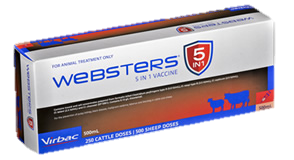
Planning for weaning
- Drenched;
- Vaccinated; and
- Topped-up with essential trace minerals.
Virbac, the maker of Cydectin®, Webster’s Vaccines and Multimin, understand this and have developed a range of solutions just right for you.
Weaner lamb health treatments
At weaning there are many health treatment factors that sheep producers need to consider; and given that no one season, farm, or lamb flock is the same, there is no ‘one size fits all’ protocol.
Nonetheless, at a minimum, sheep health experts recommend that you:
- Drench your lambs to protect them from worms
- Vaccinate for clostridial diseases relevant to your property; and
- Top-up your lambs with essential trace minerals.
Fortunately, for sheep producers, there are a wide variety of products available that meet these needs. This abundance of options, however, can create a bewildering decision-making process, but it doesn’t have to be.
The first and most important decision is drench selection. Once you have determined the drench to use, your vaccine and mineral treatment options will flow from that.
Drenching
At weaning, lambs are particularly susceptible to attack from gastrointestinal worms. This is due to:
- Lambs being too young to have a robust immunity to parasites; and
- The process of being weaned causes stress which affects the lamb’s immune system and its ability to respond to threats of disease and parasitism.
Consequently, it is considered best practice to always drench your lambs at weaning.
To drench lambs at weaning there are four important factors to consider:
- Are lambs prone to persistent attack?
- Will weaners be put into a contaminated paddock?
- Are you are expecting moderate to high rainfall for the next couple of months?
- Will the lambs be exposed to tapeworm?
- Some drenches are more effective in killing all segments of tapeworm
- What drench actives are effective on your property?
- It is recommended that sheep producers undertake drench active effective testing once every 2-3 years
- What type of drench resistance management strategy have you adopted on your farm (e.g. drench rotation, combination drenches)?
- Have you considered the benefits of breeding sheep for worm resilience?
It is recommended to work through these four considerations with a trusted animal health advisor familiar with your property. Alternatively, you can consult a Virbac area manager by contacting our customer service hotline on 1800 242 100.














